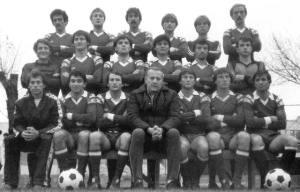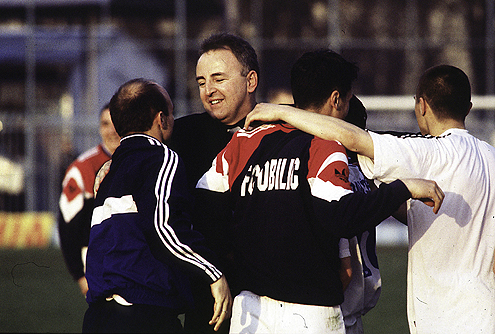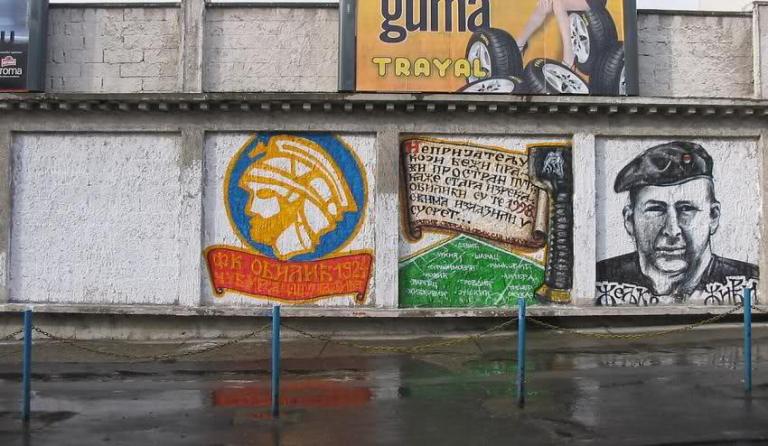 The chaos that consumed Yugoslavia during the years of its protracted civil war had implications across all walks of life. Football was no different and outlandish circumstances led to a little-known Belgrade club finding itself under the stewardship of a man indicted by the UN for crimes against humanity. Serbian journalist Bojan Babić picks up the story of the rise and fall of FK Obilić Belgrade in his first article for BTLM.
The chaos that consumed Yugoslavia during the years of its protracted civil war had implications across all walks of life. Football was no different and outlandish circumstances led to a little-known Belgrade club finding itself under the stewardship of a man indicted by the UN for crimes against humanity. Serbian journalist Bojan Babić picks up the story of the rise and fall of FK Obilić Belgrade in his first article for BTLM.
Myths, legends, glorious moments and tragic downfalls: if you were to choose one football club whose story mirrors the national history of the country in which it’s situated, it would be FK Obilić of Serbia. Founded back in 1924 by a group of young enthusiasts, Obilić was named after the much-loved Serbian national hero Miloš Obilić, a medieval knight killed in the legendary 1389 Battle of Kosovo, just after he had cunningly stabbed the Turkish Emperor Murad I.

FK Obilić spent the years before World War II establishing itself as something of a local treasure in the Vračar district of Belgrade. The immediate aftermath of the war was more challenging with the new communist regime banning the Obilić name because of its very clear Serbian origins. The club was renamed Čuburac (Čubura is a part of Vračar), and merged with another smaller local club named Šumadija. Their original name was restored in 1952 to some relief and Obilić continued its low-profile existence spent mostly in the ‘Beogradska zona’ (Belgrade Zone League, fifth and sixth tier).
During the 1970s Obilić became more widely known in the Yugoslavian Federation for the club’s vociferous fans and their passionate advocacy of Obilić’s role as a positive symbol of their Belgrade locale. Together with arch-rivals Sindjelić (another local club, based only 200 meters away and also named after a national hero), Čukarički and Grafičar, Obilić participated in an enthralling regional league with many unforgettable clashes played out in front of surprisingly large crowds that often numbered in the thousands.

A breakthrough came in 1982 when Obilić won their division and with it promotion to the fourth tier and the Serbian First League. Five years later Obilić advanced again, this time to the national Yugoslav Third League, meaning that after 64 years in existence the club would be playing games the length and breadth of the Yugoslav Federation for the first time.
The arrival on the scene of Slobodan Milošević and his nationalistic pro-Serbian agenda – enthroned in the very same Kosovo where Milos Obilić heroically died exactly six centuries earlier – impacted enormously on the club as Vračar`s proudest slipped into the hands of that most controversial of figures from Belgrade’s underground: Željko Ražnatović, or Arkan as he was more commonly known. This career criminal and former associate of the SFRY Secret Service emerged from nowhere to become leader of Red Star’s fan group in 1989. His first encounter with Obilić had come a few years earlier when he was released from jail – the club’s stadium was located right across the street from Belgrade’s Central Prison and it was the first thing he would have seen when walking through the gates!

With Yugoslavia tearing itself apart, Arkan formed the paramilitary Serb Volunteer Guard (SVG, also known as Arkan’s tigers) which engaged in fighting in Croatia and Bosnia, spreading terror and chaos wherever they ventured. Meanwhile Slovenian, Croatian, Bosnian and Macedonian clubs were abandoning the Yugoslav Football Association in their droves, so a number of lower division Serbian clubs, including Obilić, achieved unexpected promotions overnight to make up the lost numbers.
This was one giant leap for Obilić, but an even bigger one for Arkan – a shadowy figure shaping up as a cross between Pablo Escobar and Jesús Gil with the looks of actor Armand Assante. By the time he officially took over the club in June 1996, the ‘Knights of Vračar’ (as the team was nicknamed) were in the third tier and had finished runners-up to Red Star in the Yugoslavia Cup Final the previous year – this after eliminating Red Star from the same competition in 1993.

The club’s budget was sharply increasing, scouts were staking out their stadium every other Sunday and yet previously loyal fans were deserting them. The long-standing supporters knew something was deeply wrong at the club and wanted to be no part of it. Arkan was unperturbed and placed a bet of 100,000 German marks on his team to become 1998 national champions, in what would be its very first top flight season. To ensure that everything went smoothly and to prove he had the influence to do whatever he wanted, Arkan even ‘earned’ a coaching certificate with the highest grades on the subject of ‘How to motivate players before the game’.
“Order, hard work and discipline – that’s my recipe,” Arkan would say. “I brought unknown non-league players and turned them into a real warriors. They are well paid, I fulfil all my promises. And, yes, I’ve heard rumours of doping and you know what, that’s true…they eat bacon and garlic before every match”, he joked. All jocularity aside, there’s no question that Arkan and his men frequently assaulted referees and threatened opposing players to crudely achieve the victories he sought. Legend has it that during the halftime of a crucial home clash against Red Star, Arkan entered the visitors dressing-room and said to the former Real Madrid forward Perica Ognjenović: “Yo, kid, be careful what you do. Don’t make me take care of your knees with a machine gun”.

Referee Zoran Arsić was often asked to recall his memories of his encounters with Arkan: “Once he slapped me and put a gun to my head as he was mad about the result. Although I was scared, there was no way I’d pull back. And guys from the Football Association begged me not to talk about this. In exchange, I was promised I wouldn’t have to referee Obilić’s games anymore”.
In such circumstances it’s not hard to understand how Arkan won his bet and Obilić won its first and only national title. The opportunity to win the domestic double was missed through defeat to Partizan in the Cup final, but you won’t find a single Partizan fan who’ll deny that the result was not conveniently arranged in their favour as compensation for Obilić’s two league wins against their club that season.

The big time had arrived and a Champions League qualifier against mighty Bayern Munich beckoned much to the chagrin of an anxious UEFA. They were used to unpalatable club owners but this was the first time they had had to deal with one accused of war crimes. Obilić were swept aside 5-1 on aggregate with tie will remembered primarily for the ban imposed on Arkan travelling to Munich. His wife, the popular Serbian turbo-folk singer Svetlana Ceca Ražnatović, went to Germany instead having been hastily installed as the new club president.
Champions League elimination was swiftly followed by UEFA Cup loss to Atlético Madrid in a season that would be cut short by NATO bombing of the Yugoslav capital. Obilić failed to retain its controversially won title, but did finish in third place just behind the traditional powerhouses of Partizan and Red Star. And then, on the 15th of January 2000 Obilić’s future would be turned upside down when Arkan was assassinated in the foyer of a Belgrade hotel. Curiously some of his very last words were about the English Premiership:
“He asked me who I bet on. I said, you know, on Arsenal against Sunderland, on Liverpool against Watford and, finally, don’t know what to do with Chelsea-Leicester game. And Arkan was like, come on, Chelsea of course, Chelsea!”, remembers photographer Milan Djurica, who later tried to inform Arkan of the English results via his mobile phone, unaware he had already been executed.

From that moment Obilić’s existence was one of long, slow decline. For the next two years they remained competitive enough despite having lost their fear factor for opponents, but debt was mounting and the house of cards fell in on itself upon relegation in 2006. This triggered a free-fall collapse through the divisions all the way to the Belgrade Zone League (the eighth tier). Left even without the support of Arkan’s widow Ceca who was sentenced to one-year house arrest and a 1,5 million euro fine for embezzling money made from the sale of fifteen Obilić players, the club lapsed into obsolescence. Since 2014 only FC Obilić ladies team have played matches while the male teams, including the youth divisions, no longer operate. Their stadium is frequently used for UEFA Europa League Qualifiers though since most of the other Belgrade grounds are not eligible.
Sadly enough, one very unique football story which started in the name of the hero, found its painful ending with a death of a villain.
About the Author
Bojan Babic is a former player who appeared for several non-league Serbian football teams and is now a journalist. He has worked as assistant editor in chief, editor and reporter for several of Serbia’s most popular daily newspapers (Vecernje novosti, Press, Nase novine, Informer). Specialises in politics, economics and social issues, but with an eye always firmly fixed on football. Follow Bojan on Twitter @JournalistBabic



2 thoughts on “Heroes & Villains: The Rise & Fall of FK Obilić Belgrade”